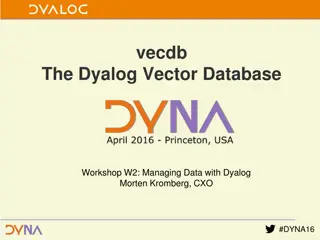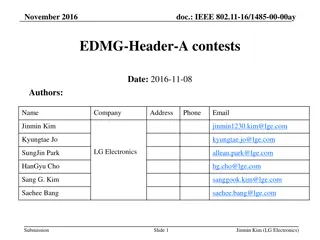
Efficient Mechanism for Storing Large Data and Querying with vecdb
Explore vecdb, an open-source database solution by Dyalog Ltd, focusing on efficient storage, parallel querying, and memory-mapped vectors. Learn about its data types, query language, and unique features like calculated columns.
Download Presentation

Please find below an Image/Link to download the presentation.
The content on the website is provided AS IS for your information and personal use only. It may not be sold, licensed, or shared on other websites without obtaining consent from the author. If you encounter any issues during the download, it is possible that the publisher has removed the file from their server.
You are allowed to download the files provided on this website for personal or commercial use, subject to the condition that they are used lawfully. All files are the property of their respective owners.
The content on the website is provided AS IS for your information and personal use only. It may not be sold, licensed, or shared on other websites without obtaining consent from the author.
E N D
Presentation Transcript
1 vector database Morten Kromberg CXO, Dyalog Ltd
2 Goals An efficient mechanism for storing large data Some number of GigaBytes Parallel Queries & Sharding Open Source (github 2 external contributors so far) Free (requires Dyalog APL) Updates, but no transactions Focus on bulk loading and analysis Very simple query language No joins (at least not to begin with) Support for Group By (Sum Max Min Count) vecdb
3 Data Types Each column is a memory-mapped vector: B: Boolean I1, I2, I4: Integers F: Float (645) C: I2 pointer to up to 32,768 different strings I4 pointers and fixed width char to come vecdb
4 Memory-Mapped Vectors Can be much larger than the workspace Only query RESULTS need to fit in the WS APL primitives including optimised and (key) apply directly without first reading data into the workspace Efficient I/O managed by the Operating System vecdb
5 Creating a vecdb columns 'Day' 'Sym' 'Price' types 'I2' 'C' 'F' options NS'' options.BlockSize 10000 grow by 10,000 date 10000/ 2 365 10,000 records 2 365 days = ~36M records sym ( date) 'MSFT' 'IBM' 'AAPL' 'GOOG' 'DYLG' price 100+0.1 date It's a good market! data date sym price params name folder columns types options db NEW #.vecdb (params, 5 data) assert 5=db.Count db.Append columns(5 data) vecdb
6 Query Language Extremely simple at this point: db.Query Where [Cols [[GroupBy]] All records for 2 days db.Query ('Day'(200 201)) columns Read DYLG records for 2 days db.Query (('Day'(200 201))('Sym' 'DYLG')) columns Select count Price, max Price, min Price group by Day Where Sym= DYLG db.Query ('Sym' 'DYLG') ('count Price' 'max Price' 'min Price')'Day' vecdb
7 Record Indices / Updates Indices of records for Day 200 ix db.Query ('Day' 200) Use them to Read data db.Read ix ('Day' 'Price') Use for Update: db.Update ix 'Price' (1.1 data[;2]) vecdb
8 Calculated Columns Virtual / computed columns can be defined: db.AddCalc 'SquareI1' 'col_I1' 'I2' '{ *2}' '{ *0.5}' name base type expr map inverse In addition to calculation formulae A map can be defined An inverse function can be specified so the base column can be searched directly vecdb
9 Sharding Horizontal sharding can be defined using a lambda expression and a selection of columns options.ShardCols 1 Day options.ShardFn '{1+2| }' Even in 1st shard, Odd days in 2nd Location of Shards can be specified precisely options.ShardFolders 'c:\devt\vecdb\srvtest\shard1' '//Mortens-Macbook-Air/vecdb/srvtest/shard2' options.LocalFolders 'c:\devt\vecdb\srvtest\shard1' '//Users/mkrom/vecdb/srvtest/shard2' vecdb
10 Using Shards Local use (typically during creation): db NEW vecdb 'c:\devt\vecdb\srvtest' 2 (now populate shard #2 perhaps using process running on machine were shard is located) Once created, via parallel server: srvproc #.vecdbsrv.Launch folder 8100 #.vecdbclt.Connect '127.0.0.1' 8100 'mkrom' db #.vecdbclt.Open folder db.Query etc vecdb
11 Parallel Queries Application Client 1 Master Server Slave serving Shard 1 Shard 1 Slave serving Shard 1 Data Application Client 2 Application Client 3 Slave serving Shard 2 Shard 2 Data Queries are broadcast to all slaves Update data is pre-sharded by Master vecdb
12 Test Driven Development Let s look at the source https://github.com/Dyalog/vecdb/tree/Server vecdb
13 Conclusions - vecdb Rudimentary but already useful Heading for 3 commercial users Next steps: Optimise parallel queries Add more character types Extend query language to allow relational functions < > etc Please join in / tell us what you need! vecdb


